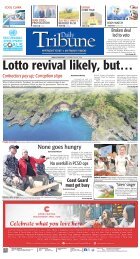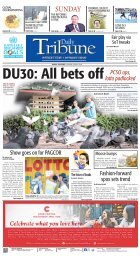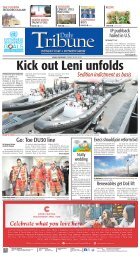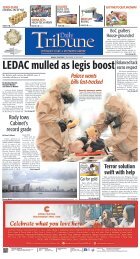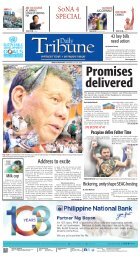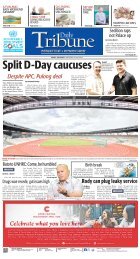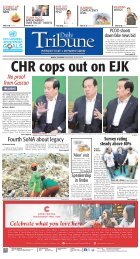15 MARCH 2019
Create successful ePaper yourself
Turn your PDF publications into a flip-book with our unique Google optimized e-Paper software.
Elmer N. Manuel, Editor<br />
Friday, <strong>15</strong> March <strong>2019</strong><br />
Daily Tribune<br />
Looking<br />
at long term<br />
Children pump water from a communal deep well. These are one of the short-term solutions<br />
of the Metropolitan Waterworks and Sewerage System to help ease the water shortage<br />
problem in Metro Manila.<br />
AFP<br />
Metro Manila is now facing a huge<br />
problem in water supply — an unseen but<br />
not improbable situation that put tens<br />
of thousands Filipinos raging over the<br />
insufficient supply of one of the major<br />
resources in the country.<br />
The metro has seen a shortage of water<br />
as the levels of the La Mesa Dam breached<br />
its critical level of 69 meters, dropping to<br />
68.93 meters over the week which left<br />
residents of Metro Manila and parts of<br />
Rizal affected by water supply interruptions<br />
since 7 March.<br />
With this, we have seen the insufficient<br />
supply resulting to Manila Water<br />
implementing water service interruptions<br />
in several areas to save more water for the<br />
coming months.<br />
What the metropolis needs is a<br />
long-term solution that can avoid<br />
these water supply shortages<br />
which was actually proposed in<br />
the past administration but was<br />
never approved.<br />
To augment the water supply crisis, the<br />
Metropolitan Waterworks and Sewerage<br />
System (MWSS) devised a plan that will<br />
cover half of the deficit in Manila Water<br />
Co.’s supply — that is, to provide deep wells<br />
throughout the metro.<br />
MWSS administrator Reynaldo Velasco,<br />
in an interview, said they already identified<br />
sources that can help ease the current water<br />
problem faced by Manila Water, adding that<br />
it can deliver at least 100 million liters of<br />
water per day (mld).<br />
Maynilad, on the other hand, will also<br />
share 50 mld to Manila Water. All in all,<br />
water from deep wells and Maynilad will<br />
amount to <strong>15</strong>0 mld for Manila Water. The<br />
other 50 mld which will complete the 200<br />
mld needed will come from the treatment<br />
plant of Manila Water in Cardona, Rizal<br />
which they projected to open this March.<br />
The activation of deep wells and sharing<br />
of water supply by Maynilad, the opening<br />
of the Cardona treatment plant may help<br />
solve the water crisis in the metro, but the<br />
way we see it, it’s only a short-term solution<br />
to a problem that can possibly recur in the<br />
not so distant future.<br />
What the metropolis needs — and<br />
the whole country for that matter — is<br />
a long-term solution that can avoid these<br />
water supply shortages which was actually<br />
proposed in the past administration but was<br />
never approved.<br />
And recently, we have seen that pertinent<br />
proposal which may address the problem<br />
on shortages.<br />
In an exclusive interview with the<br />
Daily Tribune recently, Meralco PowerGen<br />
president and chief executive officer Rogelio<br />
Singson revealed that addressing the<br />
problem on water shortage may be done<br />
if focus will be on climate change.<br />
Singson said that the solution for<br />
the unpredictable weather cycle is in<br />
impounding water — saving water during<br />
severe rains and then release it during the<br />
dry season, which can definitely augment<br />
any impending water shortages.<br />
“The solution is a water impounding<br />
system — an ordinance that says<br />
all subdivisions, major commercial<br />
establishments should be prohibited from<br />
spilling their water into drainages. They<br />
should have their own impounding system,”<br />
said Singson, who was once the secretary<br />
of the Department of Public Works and<br />
Highways.<br />
“That’s what we did in Fort<br />
Bonifacio. Burgos Circle<br />
impounds and regulates the<br />
water and this is released<br />
based on the capacity<br />
of the water creek. The<br />
water is absorbed during<br />
rains preventing EDSA<br />
and Kalayaan from being<br />
flooded. So, now there are<br />
no complaints,” Singson<br />
added.<br />
We couldn’t<br />
agree more. What<br />
the country really<br />
needs to look for<br />
now are long-term<br />
solutions that will<br />
provide better<br />
services to the<br />
Filipino people.<br />
Singson’s<br />
proposal may be<br />
worth a shot, and<br />
it can’t hurt if the government will take a<br />
second look at it.<br />
GLOBAL GOALS<br />
Women activists urge focus on services<br />
A wheelchair-bound Pakistani mother<br />
who yearned to visit a park without worrying<br />
about ramp access and a young South<br />
Sudanese woman who dreams of having<br />
affordable health care were among the<br />
speakers opening the United Nation’s (UN)<br />
largest annual gathering on gender equality<br />
and women’s rights.<br />
Addressing the 63rd session of the UN<br />
Commission on the Status of Women in a<br />
joint speech, Muniba Mazari and Mary Fatiya,<br />
both asked for basic social protections to<br />
be extended to women and girls around the<br />
world, based on need and in line with their<br />
inalienable human rights.<br />
“Being a woman has its challenges. Being<br />
in a wheelchair is the cherry on top,” Mazari,<br />
who is also the Goodwill Ambassador for UN<br />
Pakistan, told several thousand activists,<br />
diplomats, and academics gathered in the<br />
UN’s General Assembly Hall.<br />
Fatiya, who described going long<br />
distances to a school where only two toilets<br />
were available for around 600 children, said<br />
her ideal world centered around a peace<br />
existence, access to healthcare and good<br />
infrastructure: “I’m not asking for a luxurious<br />
A new United Nations-led plan has been unveiled to tackle the<br />
estimated one billion cases of influenza which occur each year, and<br />
protect against the “real” threat of a global pandemic, the head of<br />
the organization’s health agency said.<br />
Announcing the revised Global Influenza Strategy<br />
for <strong>2019</strong>-2030, World Health Organization<br />
(WHO) Director General Dr Tedros<br />
Ghebreyesus, warned that the<br />
“question is not if we will have<br />
another pandemic, but when.”<br />
“The threat of pandemic<br />
influenza is ever-present,” he said,<br />
noting that the risk of a new influenza<br />
virus transmitting from animals to humans<br />
and potentially leading to a pandemic is “real.”<br />
Influenza remains one of the world’s<br />
greatest public health challenges, according<br />
to the WHO, which says that the viral<br />
respiratory disease is responsible for<br />
between 290,000 and 650,000<br />
related deaths a year.<br />
Globalization,<br />
urbanization and<br />
mobility will<br />
Education still migrants’ ‘impossible dream’<br />
The older refugee and migrant children<br />
get the less likely it is that they will get a<br />
quality education: Less than a quarter of<br />
the world’s refugees make it to secondary<br />
school, and just one percent progress to higher<br />
education. Even for migrants who settle in<br />
wealthy, developed host countries, accessing<br />
university is an uphill struggle.<br />
For many young migrants in the UK, even<br />
those who have the legal right to remain in a<br />
new country, the idea of going to university is<br />
almost an impossible dream: not only are they<br />
are charged “overseas student” fees, which can<br />
be around double those of “home” students but,<br />
until recently, they were denied access to student<br />
loans, which puts up another barrier to entry.<br />
However, a ray of hope has been provided<br />
by Chrisann Jarrett, who is herself a young<br />
migrant (she was born in Jamaica and<br />
moved to the UK at the age of 8). While still<br />
a teenager, Chrisann set up Let Us Learn,<br />
a campaign for equal and fair treatment for<br />
young migrants. In an interview with UN<br />
News, Chrisann explained how a 20<strong>15</strong> court<br />
victory against the UK Government has made<br />
a big difference to many young UK-based<br />
SOUKAINA (left) and Mouna work in the marketing department at Label Vie’s corporate<br />
headquarters in Rabat. It has 35 supermarkets and 10 “hypermarkets” nationwide, with<br />
eight supermarkets in Rabat and one hypermarket in Salé.<br />
UN PHOTO<br />
road. I just need it and it’s my right to have it.”<br />
The annual meeting of the Commission,<br />
which dates back to 1947, will bring more<br />
than 9,000 representatives from civil society<br />
organizations to the UN over the course of<br />
the next two weeks. This year’s theme is<br />
“social protection systems, access to public<br />
services and sustainable infrastructure for<br />
gender equality and the empowerment<br />
<strong>15</strong><br />
CIVIL Society Representatives Mary Fatiya (South Sudan) and Muniba Mazari (Pakistan)<br />
address the Commission on the Status of Women held in the General Assembly Hall at<br />
United Nations headquarters. UN PHOTO<br />
of all women and girls.” Many of the<br />
marathon-discussions are expected to<br />
also focus on gender equality and the 2030<br />
Agenda for Sustainable Development.<br />
In his opening statement, Secretary<br />
General António Guterres said the<br />
Commission on the Status of Women could<br />
equally be called the “Commission on the<br />
Status of Power.”<br />
result in the next pandemic moving faster and further, the agency<br />
maintains, while also underlining that those infected with the virus can<br />
face other health threats, such as heart attacks, strokes and severe pneumonia.<br />
The WHO’s 11-year plan focuses on the formulation of robust<br />
national programs and has three goals: reducing seasonal influenza,<br />
minimizing the risk of transmission from animals to humans and<br />
limiting the impact of a pandemic.<br />
In addition, WHO is calling for better tools to prevent, detect, control<br />
and treat influenza, such as more efficient vaccines<br />
and anti-viral drugs.<br />
Influenza outbreaks tend to emphasize the<br />
pressures faced by health systems in low<br />
and middle-income countries in particular,<br />
WHO says, insisting that investing in<br />
influenza-prevention measures will<br />
encourage a rapid response<br />
to many other infectious<br />
diseases.<br />
An outbreak in<br />
Madagascar in 2002 had<br />
a 2.5 percent fatality ratio,<br />
which is very similar to the<br />
1918-1919 pandemic, WHO<br />
says, noting that the cost<br />
of pandemic preparedness<br />
globally is estimated at<br />
$4.5 billion a year, which<br />
is less than one per cent<br />
of the estimated cost<br />
needed to respond to<br />
a “medium-to-severe”<br />
pandemic.<br />
“A severe pandemic<br />
can result in millions<br />
of deaths globally,<br />
with widespread social<br />
and economic effects,<br />
including a loss of national<br />
A PUPIL receives a vaccine against influenza at a high school in the western French town of Quimper. France<br />
opened centers across the country to offer swine flu vaccinations to some six million people deemed most at<br />
risk from the pandemic sweeping the world.<br />
AFP<br />
students born abroad.<br />
“We recognized that over 2,000 students were<br />
being stopped from going to university because<br />
of their immigration status. So, despite being<br />
lawfully resident in the country, they were being<br />
told that they couldn’t move forward with their<br />
education aspirations. In 20<strong>15</strong>, the Supreme<br />
Court agreed that this was discriminatory, and<br />
we managed to influence government policy,<br />
which means that hundreds, if not thousands<br />
of young migrants are able to access a student<br />
loan and go to university, which previously<br />
wasn’t the case.”<br />
Women’s empowerment and gender<br />
equality are “essential to global progress,”<br />
United Nations (UN) Secretary General<br />
António Guterres stressed in his message<br />
for International Women’s Day which this<br />
year puts “innovation by women and girls,<br />
for women and girls,” at the heart of efforts<br />
to achieve gender equality.<br />
“Last year, for the first time, we achieved<br />
gender parity in the UN’s Senior Management<br />
Group and among those who lead UN teams<br />
around the world,” the UN chief said, adding<br />
that the organization is “working to achieve<br />
parity across the whole United Nations system<br />
within a decade.”<br />
The UN began celebrating the International<br />
UN health chief vows treatment centers protection<br />
Amid a deadly Ebola outbreak, armed militia<br />
members on 9 March <strong>2019</strong> brutally attacked an<br />
Ebola clinic in the Democratic Republic of the<br />
Congo’s (DRC) eastern city of Butembo, prompting<br />
a call from the UN’s global health agency chief “to<br />
protect the treatment centers.”<br />
Just hours after the assault, Tedros Adhanom<br />
Ghebreyesus, director general of the World Health<br />
Organization (WHO), toured the center, which was<br />
also attacked last week, thanking personnel for<br />
their steadfast dedication.<br />
“It breaks my heart to think of the health<br />
workers injured and police officer who died in<br />
today’s attack, as we continue to mourn those<br />
who died in previous attacks, while defending the<br />
right to health,” he said. “But we have no choice<br />
except to continue serving the people here, who<br />
are among the most vulnerable in the world.”<br />
The visit came as he concluded a three-day<br />
mission to the country, along with other WHO<br />
Being a woman has its<br />
challenges. Being in a<br />
wheelchair is the cherry on top<br />
New strategy<br />
vs ‘real’ flu threat<br />
Globalization, urbanization and mobility<br />
will result in the next pandemic moving<br />
faster and further<br />
Day in 1975, which was designated International<br />
Women’s Year. Over the decades it has morphed<br />
from recognizing the achievements of women<br />
to becoming a rallying point to build support<br />
for women’s rights and participation in the<br />
political and economic arenas.<br />
“Gender equality is essential to the<br />
effectiveness of our work, and we cannot<br />
afford to miss<br />
out on the<br />
contributions<br />
of half of<br />
the world’s<br />
population,”<br />
Deputy<br />
Secretary<br />
economic productivity and<br />
severe economic burdens<br />
on affected citizens and<br />
communities” WHO says.<br />
STUDENTS learning in Makod Primary and Secondary School in Tierkidi Refugee<br />
Camp, Gambella Region, Ethiopia.<br />
UNICEF<br />
Gender empowerment essential to progress<br />
leadership and senior United States officials who<br />
met with the president, government officials,<br />
partner organizations and local responders involved<br />
in the outbreak response. He also spoke to a group<br />
of partners, officials and staff in Butembo.<br />
He stressed that “these are not attacks by the<br />
community, they are attacks on the community”<br />
conducted by “elements who are exploiting<br />
the desperation of the situation for their own<br />
purposes.”<br />
General Amina J. Mohammed explained.<br />
Moreover, “women’s equal participation<br />
in the labor force would unlock trillions of<br />
dollars for global development” she continued.<br />
“Let us be clear,” she spelled out: “We<br />
cannot build the future we want and achieve<br />
the Sustainable Development Goals without<br />
the full participation of women.”<br />
AN injured suspected Mai-Mai rebel fighter is thrown into the back of a truck<br />
outside an Ebola Treatment Center in Butembo, the epicenter of DR Congo’s<br />
latest Ebola outbreak, after an attack on 9 March.<br />
AFP






